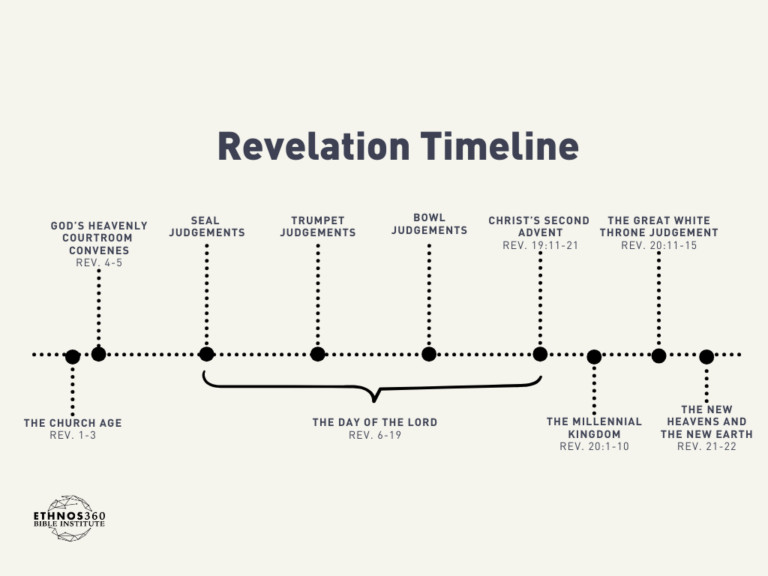
Introduction to Revelation
Revelation is the end of the story. In it, God tells us of things that are still to come. It begins with God’s righteous judgement and ends with Him dwelling with His people on the New Earth. It gives us hope when this world feels hard, and it motivates us to share about Christ so that more and more people become part of His kingdom!
Revelation Interpretive Methods
There are several different methods used for interpreting Revelation. I’ll summarize a few of them and then share the position we hold at Ethnos360 Bible Institute.
- Preterist: The book of Revelation primarily relates to the first century church. Its prophecies were fulfilled during early church history, especially through the destruction of Jerusalem and the Jewish Temple in AD 70.
- Idealist: The book of Revelation is a poetic expression of theological principles. Its “prophecies” should not be forced to correlate with events from the past or the future.
- Historicist: The book of Revelation is an outline of history from the first century until Jesus returns. Its prophecies relate to events that have occurred during church history in the last 2000 years and that will occur before Christ returns.
- Futurist: While the book of Revelation contains many theological principles, its prophecies relate to future events concerning the Day of the Lord, Christ’s Second Advent, and His eternal reign on the earth.
- Ethnos360 Bible Institute’s Position (Futurist): Revelation claims to be a book of prophecy (1:3; 22:7, 10, 18-19). Other prophecies have come to pass in real time and space as described in the prophetic texts (e.g. Mic. 5:2; Zech. 9:9; Hab. 1:6; Is. 39:7-8; Jer. 25:11-12; Is. 53:8-10; etc.). Thus, the prophecies in Revelation will also come to pass as described in the text, and God meant for His people to understand the language used in these texts (Deut. 18:21-22). EBI’s position is the futurist position.
Revelation Outline
- The Revelation of Jesus Christ’s Authority 1:1-20
- Letters to the Churches to Overcome 2:1–3:22
- The Rightful Ruler Who Judges the Earth 4:1–16:21
- The Rightful Ruler of the Earth 4:1–5:14
- Seven Seals 6:1–8:1
- Seven Trumpets 8:2–14:20
- Seven Bowls 15:1–16:21
- Judgment on Babylon 17:1–19:10
- The Warrior King and the Enemies of God 19:11-21
- The Reign of Christ and the Final Judgment 20:1-15
- The Realization of God’s Kingdom Purposes 21:1–22:21

- Seal Judgments: the beginning of birth pains as worldwide war, famine, and disease kill 25% of the earth’s population.
- Trumpet Judgments: the labor pains intensify as 33% of the earth’s remaining population is killed by demonic activity.
- Bowl Judgments: the worst suffering of all as God’s full wrath is vented upon unrepentant humanity.
- Christ’s Second Advent: the Anti-Christ and his armies are defeated at the battle of Armageddon;
- The Millennial Kingdom: Christ reigns over the nations with righteousness and justice for 1000 years; Christ’s followers are resurrected to reign with Him.
- The Great White Throne Judgment: the unrighteous dead are resurrected to stand trial for their sins and condemned to the lake of fire along with Satan and his demons.
- The New Heavens and Earth: God’s dwelling place, the New Jerusalem, descends to the New Earth where there will be no more death, curse, sorrow, pain, or suffering.
Literary Genres of Revelation
- Prophetic: This is the genre that the book claims for itself (1:3; 22:7, 10, 18-19). There are many similarities between Revelation and the OT prophets who gave messages of confrontation, warning, and encouragement to God’s people. Revelation directly refers to the OT or alludes to it over 400 times.
- Epistle: Chapters 2 and 3 contain seven letters to seven churches in Asia Minor addressing various first century issues.
- Apocalyptic: Revelation is often defined as “apocalyptic literature” based on its similarities with other writings from the first and second century. However, care must be taken when using non-biblical material to interpret Revelation. The position of Ethnos360 Bible Institute is that it is preferable to adhere to the classifications directly evident in the text itself, which are epistle and prophecy.
Date Revelation was Written
AD 96. It was written during the reign of Domitian while the church was under persecution.
Who Wrote the Book of Revelation
The writer of this book is John, the apostle. One way you can tell is how the writing styles of 1, 2, and 3 John are similar to Revelation. When John wrote Revelation he would have been in exile on the Island of Patmos.
Revelation Audience
The 1st century church which was under Roman persecution. They were encouraged to not compromise with the world and to wait for Christ’s return.
Themes in Revelation
- Jesus as Worthy: Jesus is presented as the lamb of God who, because of His atoning sacrifice, is worthy to receive an eternal kingdom and to execute God’s righteous judgment upon the earth.
- Judgment: the bulk of Revelation details God’s just verdict against rebellious humanity, Satan, and his demons.
- Eternal Salvation: Revelation details the ultimate deliverance of God’s redeemed by their resurrection to inherit Christ’s eternal kingdom on the New Earth.
Key Verse of Revelation
“The seventh angel sounded his trumpet, and there were loud voices in heaven, which said: ‘The kingdom of the world has become the kingdom of our Lord and of his Messiah, and he will reign for ever and ever.’”
Revelation 11:15
The Purpose of Revelation
Revelation mainly confronts the comprising church by demonstrating the ultimate destruction of worldly powers and the ultimate reward of Christ’s faithful servants. Revelation forces the church to recognize that Jesus is just as authoritative right now as He will be for eternity on the New Earth.
Why should you study Revelation?
We should study Revelation because the time is near. Revelation 1:3 calls those who take this prophecy to heart blessed. God wants us to know and to study what’s coming. Studying what’s coming helps us keep a God-centered perspective. He is the only one we should be worshipping. While we still have time we should share with others about His coming kingdom!
Take our free online course on Revelation!
We offer a free online course on Revelation taught by Caleb Foley that includes over 10 hours of material. Taking it will help you understand the message and structure of Revelation. It will also help you develop an urgency for reaching the lost. Click below to take the course!
Content reworked from Chad Huber’s class on Revelation at Ethnos360 Bible Institute
Edited and formatted by Eliza Noel

